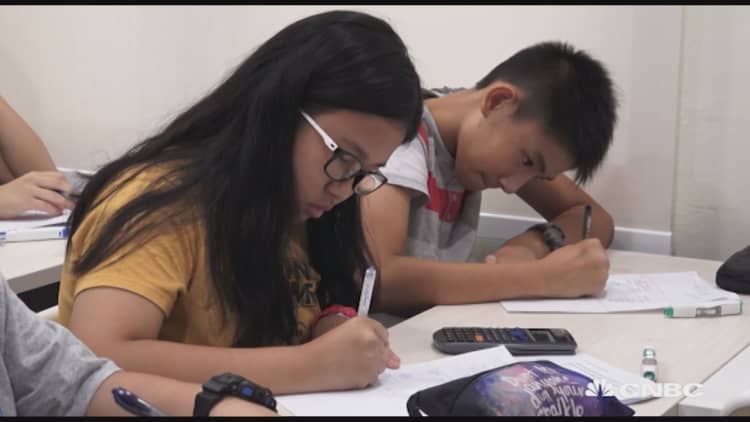
Tyle Tan just finished another Saturday tuition class at JC Economics.
It's a sunny afternoon in Singapore's upmarket Bukit Timah district, but the lights in the makeshift classroom glow a fluorescent white above dozens of empty school tables and chairs. The buzz of the shopping center outside can be heard through the sliding door.
"I was underperforming in school and it was hard to follow the school system and the notes," the 18-year-old admits.
"My parents, being Asians, want me to be competitive and they suggested I take tuition classes. I thought it makes sense, so of course I obliged," he laughs.
Tan has been taking tuition classes for the past two years and his crucial exams are just a few months away. He has ambitions to study law at one of Singapore's top universities, but he knows he needs straight As to be considered.
"With exams coming nearer, it's harder and harder to meet up with friends when you're using most of the time to study," he says. "The pressure is certainly there with everyone wanting to do well."
The one-man band
Enter Anthony Fok, one of the best-known faces of Singapore's booming private tuition scene. Just three years after he founded JC Economics, his one-man operation is bringing in more than $1 million dollars a year.
"That's for total revenue per year," he tells CNBC outside his shop-front-cum-classroom, which is covered in clippings from his press appearances.
"When I started in the year 2013, there were only about three to four students. It was a very small class size and I knew the students personally. Soon the word of mouth grew and now I teach about 200 to 300 students a year."
Fok is part of an elite group of Singaporean "super tutors," who charge top dollar for top grades. And parents are more than willing to pay, in the hope of giving their teenager a leg up in the city-state's highly competitive education system.
"There is huge demand from parents," Fok, a former Ministry of Education teacher, explains. "It's fuelled by competition and it's fuelled by ambition to get the students to top schools in the country. So parents are willing to splurge money on tuition services. It's a big industry."
Given the limited vacancies in his class near examination time, Fok says he's encountered parents who are willing to pay up to $25,000 just to guarantee a spot for their child (he didn't accept the cash.)
Christopher Chen and Nicholas Ng joined Fok's classes when the super tutor first started his business. They attest to his skills.
"Before I had tuition classes I was failing my econs," Chen, now first-year business student at the National University of Singapore, recalls. "After coming to Mr. Fok's classes, I find economics very interesting and it helps me a lot to understand how economics works in real life."
"What makes him a super tutor? To be frank, he can deliver results," Ng agrees. "Parents in Singapore are really result orientated. They look for tutors that can deliver results for their kids and if a tutor does that, the parent will sign his or her kids to the class."
The growing chain
Fok is one of many tutors capitalizing on a culture that demands academic success. In nearby Novena, fellow super tutor Janice Chuah is midway through her Primary 1 mathematics class.
"Children, let's analyze," she says, standing in front of a whiteboard with a complex-looking equation. Her class, some as young as 7 years old, obey politely as she sums up the task.
Chuah left her full-time teaching job to try her hand at home-based tuition about seven years ago. She began with just four fee-paying students and grew her business into a brand through word of mouth. She launched Concept Math in 2011.
"That year I recall we had close to 200 students and then we took another two years to make our first $1 million," she tells CNBC.
Concept Math was a calculated risk and the numbers speak for themselves. The business now teaches almost 1,000 children and Chuah recently opened a second facility to cater to growing demand.
"I've not seen the financial report at the end of this year [but] I'm quite sure it's going to be an interesting number," she smiles.
But Chuah rejects the super tutor title, and says too much emphasis is placed on a tutor pay. She says the growth of her center is a reflection of her hard work and dedication to the students.
"I've been able to capitalize on my strengths and monetize my skillset," she explains.
The changing landscape
Chuah welcomes recent reforms to the Singaporean education system that are aimed at moving away from an excessive focus on academic results.
"The Ministry of Education has introduced a more broad-based way of banding the children, so the focus is definitely moving away from just grades, grades, grades, to a more holistic education."
Tyle Tan, meanwhile, has mixed views on the high stakes tuition culture in Singapore.
"It really impacts the student's wellbeing and in my opinion it's not really necessary," he says. "If everyone doesn't have tuition then it's a fair competition, but right now, for those who go to tuition as opposed to those who don't, you're more likely to do well."
Follow CNBC International on Twitter and Facebook.


